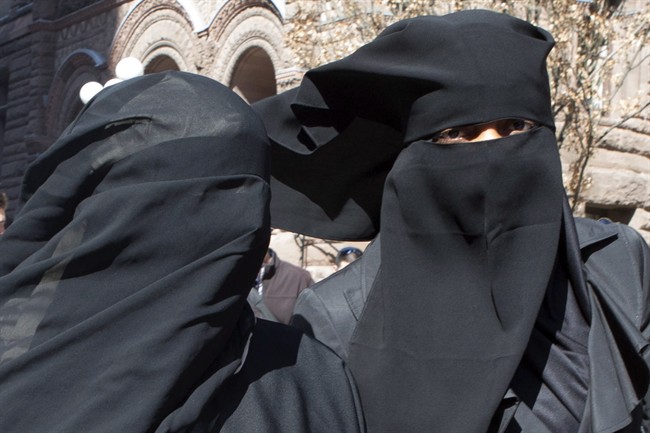The major unions representing federal public servants across Canada say they are unaware of a single incident involving an employee donning a niqab on the job.

“There have been no complaints about this before, (so) why is this suddenly an issue two weeks before Canadians go to the polls?” said Debi Daviau, president of the Professional Institute of the Public Service of Canada.
“We’re not going to be sidetracked from discussing the real issues that affect the public service and the need for change in this country.”
On Wednesday, Public Service Alliance of Canada president Robyn Benson told Global News that a ban on the niqab in the public sector — which is something the Conservatives say they are examining — “would contravene our collective agreements and the Canadian Human Rights Act.”
It’s the most recent example of the strained relationship between the public-service unions and Stephen Harper’s government. Among other things, the unions have protested cuts to the bureaucracy, engaged in a court battle over sick-leave provisions and expressed concerns about a perceived muzzling of government scientists.
According to Donald Savoie, a Canada Research Chair in Public Administration and Governance at Université de Moncton who has spent much of his career studying the public service, Ottawa could institute a niqab ban in federal offices relatively easily.
“There’s nothing to prevent the government from establishing statutes, policy or regulations,” Savoie noted, but those new rules could subsequently be tested in court. At that point, they would potentially run up against Charter rights or conflicting regulations.
“All things are possible, but the other question is whether it is appropriate,” Savoie said.
“To have this (discussion) smack in the middle of the election campaign … to draw attention to this non-issue … I find that a bit disturbing, frankly.”
Unless a veil violates security, health or safety regulations for an employee, he added, employees “surely” have the right to wear whatever religious garb they please. As for veiled women seeking to receive a public service, accommodations can be made, according to Savoie, “unless it compromises the integrity of the program – and by that I mean if you need to identify the person who is asking for the public service. Then there is an issue.”
Earlier this week, a local Conservative candidate in Ottawa voiced his opposition to a formal ban on face-coverings in any workplace, a position seemingly at odds with his party’s stance.
“I fundamentally believe that they should be able to wear them in the workplace — they should be able to wear them everywhere,” said Damian Konstantinakos, the Tory candidate in Ottawa-Centre, during a local debate.
“I think the wrong approach would be to, basically … to pass any kind of law that says you can’t wear these — wear a niqab — or really regulate it in any way. From a personal level that offends me.”
Quebec is already moving forward with legislation that will ban face-coverings while giving or receiving a provincial public service. During a campaign stop in Saskatoon, Harper called the approach “responsible.”



Comments